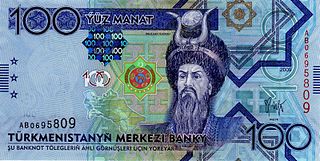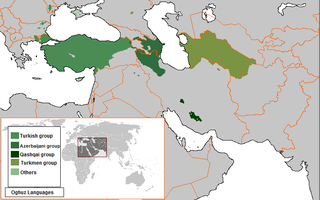The history of Turkmenistan is largely shrouded in mystery, its past since the arrival of Indo-European Iranian tribes around 2000 BC is often the starting point of the area's discernible history. Early tribes were nomadic or semi-nomadic due to the arid conditions of the region as the steppe culture in Central Asia was an extension of a larger Eurasian series of horse cultures which spanned the entire spectrum of language families including the Indo-Europeans and Turko-Mongol groups. Some of the known early Iranian tribes included the Massagatae, Scythians/Sakas, and early Soghdians. Turkmenistan was a passing point for numerous migrations and invasions by tribes which gravitated towards the settled regions of the south including ancient Mesopotamia, Elam, and the Indus Valley Civilization.

The Oghuz, Oguz or Ghuzz Turks were a western Turkic people who spoke the Oghuz languages from the Common branch of Turkic language family. In the 8th century, they formed a tribal confederation conventionally named the Oghuz Yabgu State in central Asia. The name Oghuz is a Common Turkic word for "tribe". Byzantine sources call the Oghuz the Uzes. By the 10th century, Islamic sources were calling them Muslim Turkmens, as opposed to shamanist or Buddhist. By the 12th century this term had passed into Byzantine usage and the Oghuzes were overwhelmingly Muslim.
Oghuz or Oğuz may refer to:

A municipality is a local government unit (LGU) in the Philippines. A municipality is also usually called town in its archaic term, since municipalities have the functions of a town since its inception. They are distinct from cities, which are a different category of local government unit. Provinces of the Philippines are divided into cities and municipalities, which in turn, are divided into barangays, formerly barrios. As of March 31, 2017, there are 1,489 municipalities across the country..

The Pechenegs or Patzinaks were a semi-nomadic Turkic people from Central Asia speaking the Pecheneg language which belonged to the Oghuz branch of Turkic language family.

Oghuz (Oğuz) is a rayon of Azerbaijan. Till 1991, the name of the rayon, established in 1930, was Vartashen. In 2016, it had a population of 43,100. The capital ist Oğuz, also Vartashen until 1991.
The Book of Dede Korkut or Book of Korkut Ata is the most famous among the epic stories of the Oghuz Turks. The stories carry morals and values significant to the social lifestyle of the nomadic Turkic peoples and their pre-Islamic beliefs. The book's mythic narrative is part of the cultural heritage of Turkic countries, including Turkey, Azerbaijan, Turkmenistan, Kazakhstan and to a lesser degree Kyrgyzstan.

Oğuz is a city and municipality in, and the capital of, the Oghuz Rayon of Azerbaijan Republic. The city was known as Vartashen until 1991 and was renamed to Oğuz in 1991.
Pecheneg is an extinct Turkic language spoken by the Pechenegs in Eastern Europe in the 7th–12th centuries. It is also possible that the language was spoken by the Cumans, per Byzantine princess Anna Komnene.
Khorasani Turkic is an Oghuz Turkic language spoken in northern North Khorasan Province and Razavi Khorasan Province in Iran. Nearly all Khorasani Turkic speakers are also bilingual in Persian.

Abu Ali Fadhl ibn Hasan Tabresi known as Shaykh Tabarsi, was a 12th-century Persian Shia scholar who died in 548 AH.

Oghuz Khagan or Oghuz Khan was a legendary and semi-mythological khan of the Turks. Some Turkic cultures use this legend to describe their ethnic origins and the origin of the system of political clans used by Turkmen, Ottoman, and other Oghuz Turks. The various versions of the narrative preserved in many different manuscripts has been published in numerous languages as listed below in the references. The narrative is often entitled Oghuznama, or narrative of the Oghuz.
The Sangguniáng Bayan is the local legislative branch of the municipal governments in the Philippines. It is responsible for passing ordinances and resolutions for the administration of a municipality. Its powers are defined by the Local Government Code, passed by the Congress in 1991.

Şirvanlı is a village and municipality in the Oghuz Rayon of Azerbaijan. It has a population of 824.

Yaqublu is a village and municipality in the Oghuz Rayon of Azerbaijan. It has a population of 603.

Qarabaldır is a village and municipality in the Oghuz Rayon of Azerbaijan that has a population of 502.
Bayan, Azerbaijan may refer to:

Zandabad is a village in Owch Hacha Rural District, in the Central District of Ahar County, East Azerbaijan Province, Iran. At the 2006 census, its population was 1,104, in 224 families.

The Oghuz languages are a sub-branch of the Turkic language family, spoken by approximately 110 million people. The three languages with the largest number of speakers are Turkish, Azerbaijani and Turkmen, which combined account for more than 95% of speakers.











